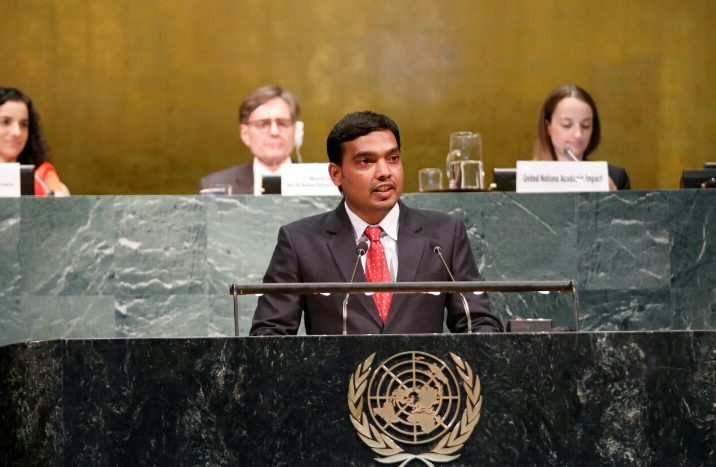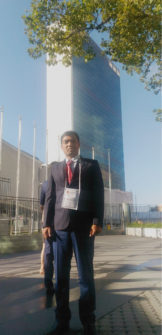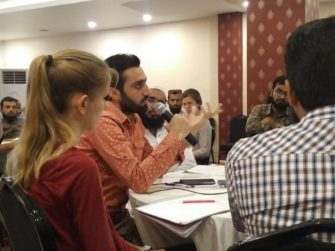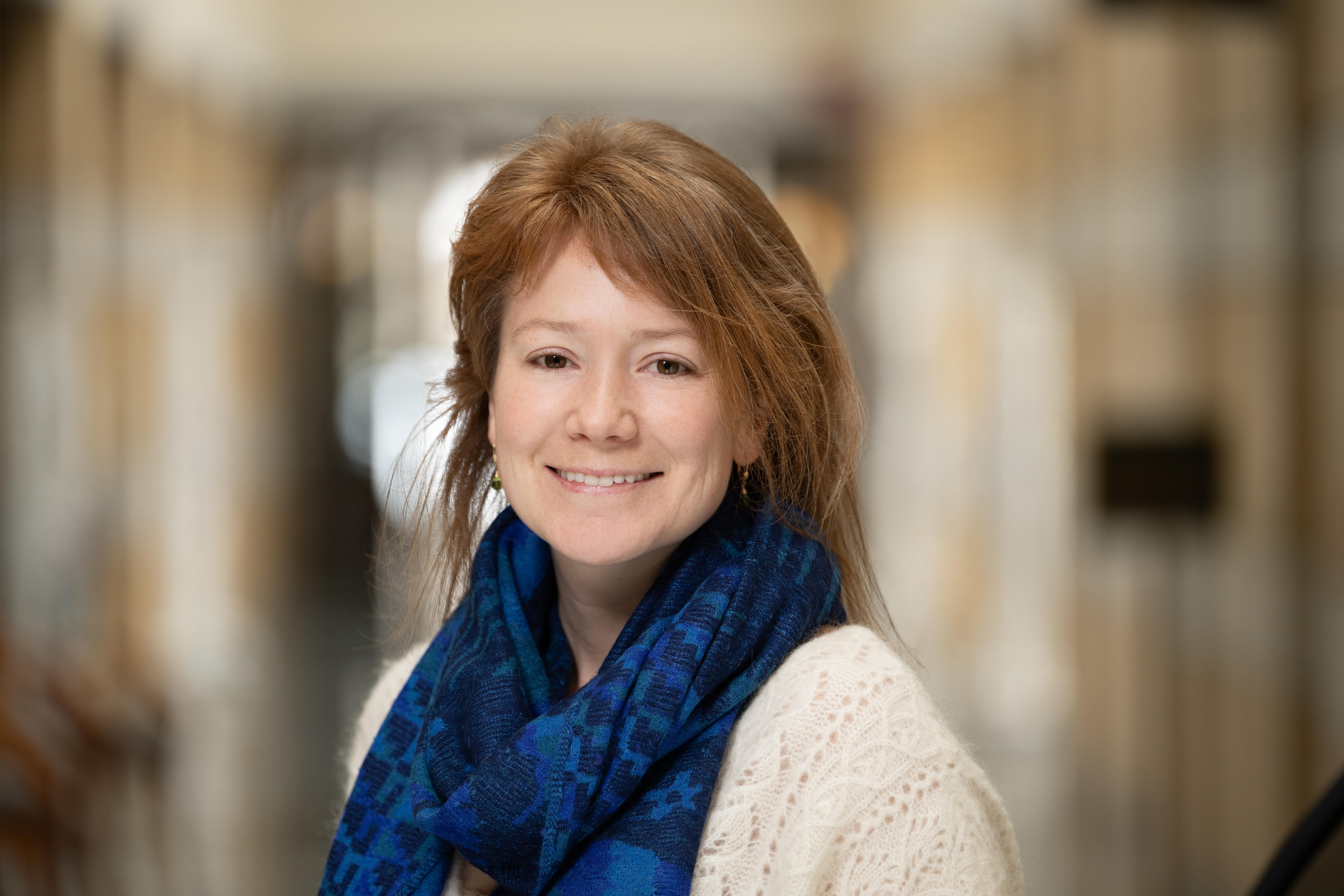
Before joining Notre Dame’s Madrasa Discourses project, Indian madrasa graduate Aadil Affan would have told you that accommodating or accepting other cultures was a heresy (bid’ah) unacceptable to his version of Islam.
Educated in a madrasa, an Islamic religious school, for most of his formative years, Affan is a young religious scholar, a member of the ulama, and his word carries weight in his community. His perspective on Islam’s approach towards different religio-ethnic groups, on scientific innovations, and many other things, may one day guide the position of the co-religionists around him.
Yet after six months in the Madrasa Discourses project, this recent MA graduate in Arabic from Jawaharlal Nehru University in Delhi, India, shared a remarkable about face, in no less an esteemed location than the United Nations (UN). Affan’s essay on global citizenship, language, and cultural understanding was selected among 2,000 submissions to the UN’s “Many Languages, One World” youth competition. He writes in his essay:
There are some religious values and cultural norms that we all share, which are acceptable to all. The contemporary world in its present situation needs dialogue among diverse peoples and communities. Such inter-religious dialogue can help to eradicate hatred between people of different faiths which is spread by evil elements. When people start connecting over common human values it leads to mutual cooperation and understanding.

On July 21st, 2017, he presented at the well of the United Nations General Assembly, proposing a solution to the grave paucity of education in his home state of Bihar, one of India’s poorest and most underdeveloped regions. No less remarkable was the fact that his essay, attached below, is written in Arabic, a second language for the young Indian. After visiting the UN, Affan joined his classmates at the Madrasa Discourses Summer Intensive in Kathmandu, Nepal, where his colleagues had been involved in a rigorous exploration of how concepts such as cosmopolitanism and multiculturalism intersect with Islamic thought today.
When asked about how the project has influenced him, Affan points to an essay he read in the course by Dr. Umar Faruq Abd-Allah on Islam in the United States called, “Islam and the Cultural Imperative”. “Islam is like a “crystal clear river… Its waters [] are pure, sweet, and life-giving but—having no color of their own—reflect the bedrock (indigenous culture) over which they flow” writes Abd-Allah (1). Assigned in a Madrasa Discourses module that shed light on the encounter and exchange between Muslims and other societies, such as Greek philosophy and Persian courtly culture, students explored the flexibility of Islam in welcoming new practices and modes of behavior. The openness that Muslim societies showed to the variety of human experience enabled them to organically plant roots in new places, and humankind has benefitted as a result, not least through the “epoch-making” translation of millions of important Greek texts to Arabic that preserved Aristotelian and other works for posterity (Gutas, 8).
In their second semester of Madrasa Discourses, students read about Islam’s rich intellectual history and its relation to local and international cultures in Dimitri Gutas’s Greek Thought, Arabic Culture; Deborah Tor’s “Islamisation of Iranian Kingly Ideals in the Persianate Fürstenspiegel”; Marshall Hodgson’s Venture of Islam; Michael Cooperson’s essay on “Culture” in Key Themes for the Study of Islam; and Abou El Fadl’s A Conference of the Books: The Search for Beauty in Islam. Experts, including Rashied Omar, as well as others like Gabriel Reynolds, Deborah Tor, and Thomas Burman from Notre Dame visited the online classroom to interact with students and share their knowledge about the material.

Channeling what he learned in an online session from Notre Dame’s Professor Rashied Omar, Affan noted that Islam is a “culture friendly” religion, and that many other religions today appreciate diverse forms of good conduct and behavior. This does not mean “blind acceptance,” Dr. Omar notes in a 2015 sermon students also read: “The process of adopting sound customary practices from local cultures was facilitated by Islamic jurisprudence through the technical process known as al-‘urf or al-‘adah” (7).[1] Yet this friendliness and openness is important because “culture governs everything about us, molding our instinctive actions and natural inclinations,” Affan went on. “It’s human nature to love peace and hate disorder.”
Originally taught a strict interpretation of Islamic tradition, which left little if any room to question the authenticity of material, or to consider the possibility of different and equally legitimate perspectives, Affan tells us the Madrasa Discourses program “has changed my way of thinking…. I am now enjoying navigating uncovered areas of Islam that were previously hidden from me.”
In his sermon, Dr. Omar enjoins: “This new reality requires a shift in mindset from an inward-looking disposition that seeks to preserve culture such that it becomes fossilized, to a disposition that is embracing of cultural transformation and growth” (10). Affan took that message to heart and applied it to his role and place in India. Through teaching and service in their respective homelands, many other Madrasa Discourses students are also actively involved in creating and strengthening Muslim identities which are deeply rooted in the Islamic intellectual tradition and influential in shaping positive and relevant Muslim discourses in the modern world. Aadil Affan’s successful essay is but one prominent example.
Congratulations, Aadil!
Biography: Aadil Affan is a graduate of Jawaharlal Nehru University, New Delhi, where he recently completed a Master’s in Arabic Language and Literature. Originally from Katihar Bihar India, Affan learned the value of education early and received his primary and secondary education at Nadwatul Ulama Lucknow. He plans to continue his higher education in the hopes of one day becoming a professor. He is also an avid cricket player and enjoys reading.
[1] Omar, R. (2015). Fostering Inclusive Muslim Cultural Traditions and Practices. ‘Id al-Adha Khutbah’ on 24th September 2015/10th Dhu al-Hijja 1436. Claremont Main Road Masjid, South Africa.

